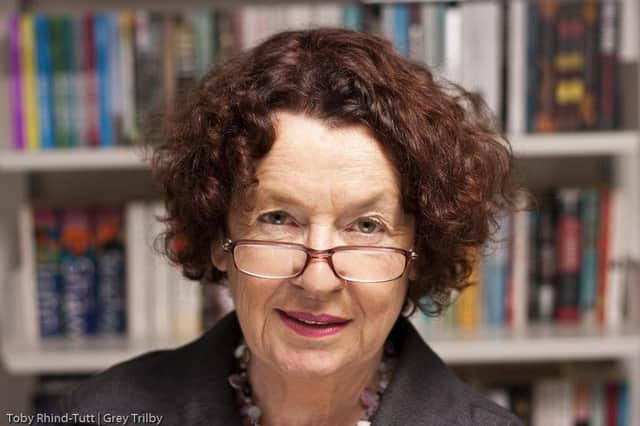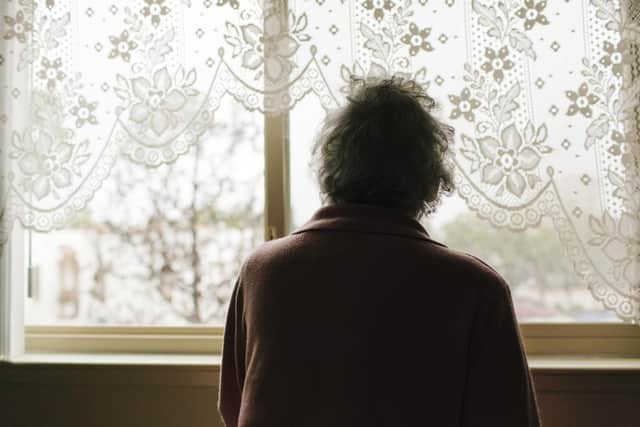Ruth Dudley Edwards: The emphasis of care for the elderly should be on leaving people their independence as long as possible


From the beginning of the pandemic, we were told of carnage in care homes, of a shortage of Personal Protection Equipment (PPE) that put staff and residents at risk and killed young and old and there were countless awful stories of people being forbidden by Covid rules to say goodbye to their loved ones.
I very much doubt if many people in residential care, given a choice, would have opted for an extra year of life if they knew they would be looked after exclusively by people dressed like aliens and forbidden to touch those who meant most to them whom draconian rules meant they could see only through a closed window.
This inevitably caused me to think about my own family.


Advertisement
Hide AdAdvertisement
Hide AdShortly after I was born my paternal grandparents required looking after so my parents bought a bigger house.
When Grandfather Edwards died, my father told his bullying and frequently drunk mother that she would be tolerated only if she foreswore alcohol, which, to do her credit, she did.
Since drunk or sober she could start a fight in a morgue, meals were brought to her room, where my mother frequently had to put up with rude comments about her peasant ancestry.
Grandmother lasted until 85 keeping herself busy with political meetings.
Advertisement
Hide AdAdvertisement
Hide AdGrandmother O’Sullivan arrived to live downstairs when she had an accident at home and her three daughters decided that instead of taking risks she should spend six months at a time with each of them.
She left the little house in rural Cork where she had spent her adult life and instead of tending her flowers and hens and having the odd neighbour drop by, she was moved to Dublin where she was utterly miserable.
When the experiment with my mother and aunt (both working teachers) was acknowledged to be a failure, they came to a financial arrangement with the Cork aunt knowing she was bad-tempered, but at their wits’ end for permanent solution.
With no purpose, Nanny declined rapidly into dementia. She lasted until 95 and my mother and I later agreed it was a pity she was ever unrooted.
Advertisement
Hide AdAdvertisement
Hide AdAs my parents, complicated people whom I adored, hit their late 70s, I worried about their future.
I knew that if my father died, my mother could move from Dublin to London — where she often stayed with my husband and me and was popular with our friends. But she died suddenly of a heart attack at 80 leaving behind a broken-hearted alcoholic who would have been incapable of being transplanted to a different world.
We did what we could, and visited as often as possible, but all alternatives seemed dire.
“You mustn’t worry about me, my darling,” he would say sometimes as he poured another whiskey. “Just put me in an old man’s home.”
Of which of course he was terrified.
Advertisement
Hide AdAdvertisement
Hide AdIt was a great relief that after three unhappy years he died before any terrible decisions had to be made.
There was a remarkable book published just four years ago by my friend David Goodhart called The Road to Somewhere, which pointed out that there was a fault line in Britain between ‘Somewheres’— the 50% or so of the population rooted in a specific place or community who tend to be small town or rural, patriotic and socially conservative — and ‘Anywheres’ — the 25% usually more educated, socially liberal and footloose.
“Inbetweeners” make up the rest.
Since the Anywheres are the ruling elite, their defeat by the Somewheres in the Brexit referendum caused consternation and seriously split society.
But when I visit my Somewhere friends I’m struck by how a network of friends and relatives in a smallish area makes it possible for people to stay in their own homes very often until they die, happy to help their working families by being loving and supportive grandparents.
Advertisement
Hide AdAdvertisement
Hide AdWhat would make a massive difference to the old in all communities is to give them every opportunity to do voluntary work without stupid bureaucracy and idiotic regulations intervening, and to put the emphasis of care on leaving people their independence as long as possible.
So many people end up in care homes because they have no family close and local authorities can’t supply a specific carer to give them the regular attention they need.
Some day we will know more about what went on over Covid and the old, but for now, looking from the vantage point of somebody old enough to have friends dying regularly, two things strike me as being incontrovertible.
The first is that we have to die of something, and death over three-score-years-and-ten isn’t actually tragic.
Advertisement
Hide AdAdvertisement
Hide AdThe second is that most old people want to spend their last years being useful, having frequent contact with those they love and with the promise of good palliative care.
They’re not demanding immortality.
• Owen Polley: Unionism needs leaders who set the agenda
• Henry McDonald: The cross border policing pursuit plan has not been thought through
Advertisement
Hide AdAdvertisement
Hide Ad• Other articles by Ruth Dudley Edwards below, beneath that information on how to subscribe to the News Letter:
• Ruth Dudley Edwards Aug 24: President Joe Biden is ignorant, arrogant, stubborn — and too damn old
• Ruth Dudley Edwards Aug 17: Thomas McElwee’s story is one of lives ruined by hatred
——— ———
A message from the Editor:
Thank you for reading this story on our website. While I have your attention, I also have an important request to make of you.
Advertisement
Hide AdAdvertisement
Hide AdWith the coronavirus lockdown having a major impact on many of our advertisers — and consequently the revenue we receive — we are more reliant than ever on you taking out a digital subscription.
Subscribe to newsletter.co.uk and enjoy unlimited access to the best Northern Ireland and UK news and information online and on our app. With a digital subscription, you can read more than 5 articles, see fewer ads, enjoy faster load times, and get access to exclusive newsletters and content. Visit https://www.newsletter.co.uk/subscriptions now to sign up.
Our journalism costs money and we rely on advertising, print and digital revenues to help to support them. By supporting us, we are able to support you in providing trusted, fact-checked content for this website.
Ben Lowry
Acting Editor